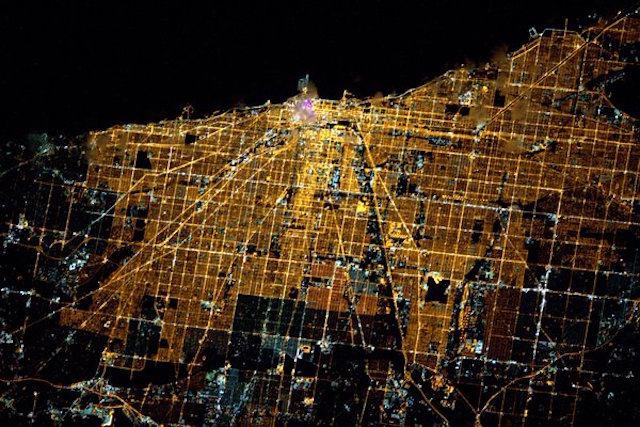Chicago To Switch To Cheaper, Whiter Outdoor Lighting
By Mike Ewing in News on Apr 18, 2016 6:54AM
The city plans to change almost all outdoor lighting in Chicago’s public spaces over to long-lasting LED lights in an effort to save money and promote safety, Mayor Rahm Emanuel announced in a statement Sunday. Approximately 270,000 of the current high pressure sodium lights will be swapped out over the next four years.
“New lights will provide more reliable and improved nighttime visibility, giving communities a greater sense of safety,” Emanuel said in his statement.
They'll also save the city money. LEDs use less electricity and last three times longer than Chicago's current outdoor lighting, so the “Chicago Smart Lighting Project” will be paid for by borrowing against expected savings.
One effect of the lights being changed: The Chicago skyline will lose its warm orange glow, and begin to glow with the whiter hues of LEDs. Evidence of the transition is already visible from space, as you can see in the photo of Chicago above, shot from the International Space Station.
Not that Chicago's glow is something we should necessarily hold onto. Whether orange or white, Chicago's glow is called “light pollution” by experts, and can have harmful effects on local wildlife. (According to some theories, it can disrupt human's circadian rhythms, too.) Chicago is considered one of the most light-polluted cities in the country, and adding shields to streetlights could help with this issue—though it’s unclear whether addressing light pollution is as big a priority for the city as saving money.
Switching to LEDs could also open the door for some high-tech upgrades. Networked LEDs can run applications that dim the lights when needed or flash them when police are called to the area. Cutting-edge “Li-Fi” technology even uses LEDs to create high-speed wireless networks. It all depends on the kinds of upgrades that get pitched to the city during the bidding process.
